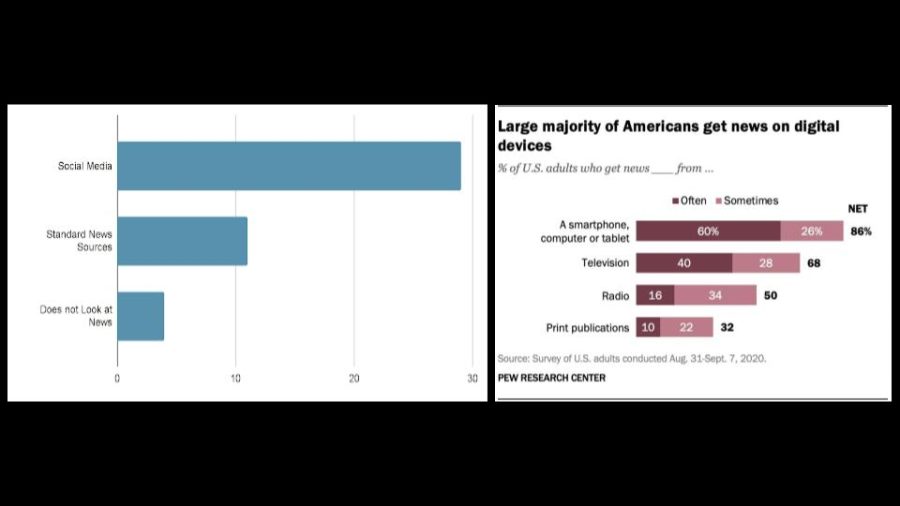Teens Don’t Read Newspapers, but They Do Pay Attention (Mostly)
These charts above show how the North Polk High School Students compare to a national study about where adults get their news from. As you can see, the data compared pretty closely to the habits of North Polk Students.
September 16, 2022
Many speak of the end of news journalism and the end of newspapers, all because of the younger generations.
It does not take a quote or statistic for people to know that older generations believe that teenagers do not read or consume any news.
The way people have ingested news has evolved throughout the years. From word of mouth, to paper, to radio, to television, and now to online websites and social media. News has evolved with the evolution in technology and has been centered around making it easy for people to understand what is going on around them.
The big perception lately seems to be the fact that teenagers do not spend time reading the news, and therefore they are misinformed. My question is: how many adults have cited they found something on the news when in actuality it was from Facebook? Teenagers might not read “The New York Times,” but they might follow them on Twitter. There are plenty of accounts on TikTok, Instagram, Facebook and Twitter that provide news that is easily accessible to teenagers and is crafted in a way for younger audiences to comprehend and be engaged.
Teenagers do not have time to watch the nightly news at 6 p.m. and they definitely do not have the time to read an entire newspaper. They do have time to do what they already do anyway: scroll through social media.
Personally, I was curious to see if my classmates had knowledge of international affairs, and if they do, how much? I asked each student that I interviewed the exact same two questions. Do you pay attention to the Ukrainian War, and do you think it is important for teenagers to pay attention to international news and conflicts?
Before I started interviewing, I will say that I did not have much faith in my classmates, but I was happily proven wrong.
Below are quotes from North Polk Students stating if they know anything about the Ukrainian War.
- “At the beginning [of the Ukrainian War], I did but then it got too sad and I was like ‘I don’t need this.’”
- “I think it is important for us to be aware but I don’t think we have to follow, like step by step, daily things that go with it. Weekly or monthly I think is okay but daily is too much.”
- “I know absolutely nothing about the Ukrainian War, but I probably should know more than I do.”
- “ I do know about the Ukrainian War and I think it’s important that people learn about stuff internationally because it helps us understand what’s going on on our Earth. It helps us learn from our lessons and basically to not repeat history because history is doomed to repeat itself so if we take something and we make it better then we basically won’t have to worry about it in the future which gives us a better society.”
- “I don’t know much about it, but I do know that a lot of the information being spread by the media is very untrue and puts a lot of pressure and blame on Ukraine’s government and the people there. I think that a lot of the attention that’s being given is more in the way of, ‘let’s prevent this from happening in America,’ instead of, ‘let’s help Ukraine,’ which is not good.”
- “I do not know much about the Ukrainian War that is going on right now because I don’t pay that much attention to the news.”
Most students that I interviewed had some notion about the war and its implications, but most of that knowledge stems from the beginning of the war, not necessarily what is happening now. I used the example of Ukraine as an overarching example to prove if students kept up with international affairs, but if I used the floods in Pakistan instead, the answers could have been vastly different.
There was one thing that almost all students agreed on, even the ones that do not follow the news – teenagers need to stay updated on some level.
Below students responded to the question: do you think it is important that teenagers pay attention to the news?
- “I read up on the news sometimes. Every once in a while I look for casualties or if I’m going to get deployed in the future.”
- “Just to stay updated, so they know what’s going on and they’re not just mindlessly scrolling on TikTok or something.”
- “Yes, because it lets them get caught up to date on what’s important, about governments and politics.”
- “I feel like if we’re going to talk about super big events in history, then we should be talking about them when they’re actually happening too.”
- “Definitely because in our country a lot of our beliefs are that if it doesn’t affect us, we don’t need to worry about it. Which is so untrue because we should be caring about every culture and country and people, and we have a lot of power as being the United States and I think a lot of the time we don’t use that for any sort of good. If people our age start paying attention to that stuff I think we could have a big impact and actually help those places.”
- “I think kids my age, I feel like some pay attention that are involved in that type of stuff, but I feel like most of us don’t really follow the news.”
Teachers within the building also think it is important for students to be up-to-date on local and international news. Student teacher Garret Severseike shared his opinion on the matter, “I do think it is important. Obviously, you don’t need to be a 15-year old that has the knowledge to have a degree in political science at this time, but I do think knowing kind of what’s going on in the world at the time, not only prepared you for what you could be studying and looking at in the future but also just gives you an idea about the world doesn’t always work as we think it does in the United States there’s a lot of moving pieces, a lot of chess pieces going around.”
While this sample of teenagers was small, in some ways it does prove that teenagers are trying to keep with recent events. They might now always have the time of day that others do to watch the nightly news or read the paper, but they mostly realize that staying updated on large scale international and national events is vital.
To further this experiment, I did a small survey around the school to see where students got their news from. I asked 44 students of varying grades, genders and demographics where they got their news from and I would say that the news was not necessarily surprising. Twenty nine students get their news from social media, eleven students get their news from traditional news sources and four do not consume any news at all.
Teenagers these days get a lot of flack for their social media and overall phone habits, but some of this is good. Social media has led to a lot of accurate, first hand accounts of breaking news that can be viewed on almost all social media platforms.
With the crazy schedules that everyone has, news is consumed in the most convenient way possible and for teens that is through social media. The next time you are quick to judge a teen about their phone habits, first: think about your own, and second: realize that social media has the capacity to inform a large amount of people in an easily accessible, and digestible way.


